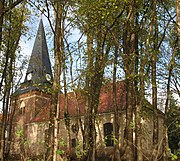Hennigsdorf
History
The town was first mentioned in 1375, when it was part of the Bohemian Crown. Afterwards it was part of the Margraviate of Brandenburg, then of the Kingdom of Prussia from 1701, and of the German Empire from 1871. During World War II, in 1944, a subcamp of the Sachsenhausen concentration camp was established, in which some 650 women, mostly Polish, were imprisoned and subjected to forced labour. In April 1945, the subcamp was dissolved and the surviving prisoners were sent on a death march to the Ravensbrück concentration camp.
After the war, it formed part of East Germany. The municipality shared its borders with the former West Berlin, and so during the period 1961–1990 it was separated from it by the Berlin Wall.
In 1951/2, the Havel Canal was constructed to link Hennigsdorf with Paretz, thus avoiding a passage through the reach of the River Havel, between Spandau and Potsdam, that was under the political control of West Berlin. The canal is still in use, providing a shorter route for shipping from west of Berlin to the Oder–Havel Canal and Poland.
Geography
Subdivision
Hennigsdorf consists of 3 districts:
- Hennigsdorf
- Nieder Neuendorf (since 1923)
- Stolpe-Süd (since May 1, 1998)
Neighbouring places
Twin towns – sister cities
Hennigsdorf is twinned with:
 Alsdorf, Germany
Alsdorf, Germany Choisy-le-Roi, France
Choisy-le-Roi, France Kralupy nad Vltavou, Czech Republic
Kralupy nad Vltavou, Czech Republic Środa Wielkopolska, Poland
Środa Wielkopolska, Poland
Economy
Located in Hennigsdorf is the Bombardier LEW Hennigsdorf train factory and a steel smelter.
Sport
Hennigsdorf is home to Stahl Hennigsdorf Rugby, a rugby union club. The team, formed in 1948 under the leadership of Erwin Thiesies, was the most successful side during the East German era of the town, having won 27 national championships from 1952 to 1990.
Demography
-
Development of Population since 1875 within the Current Boundaries (Blue Line: Population; Dotted Line: Comparison to Population Development of Brandenburg state; Grey background: Time of Nazi rule; Red background: Time of communist rule)
-
Recent Population Development (Blue Line) and Forecasts
|
|
|
Notable people

- Michael Hartmann (born 1974), footballer
- Frank Klawonn (born 1966), rower
- Dirk Kummer (born 1966), actor, director, writer
- Martin Männel (born 1988), footballer
- Erich Muhsfeldt (1913–1948), SS officer at Auschwitz and Majdanek concentration camps executed for war crimes
- Erich Priebke (1913–2013), Nazi war criminal
- Karsten Schmeling (born 1962), rower
- Erwin Thiesies (1908–1993), rugby union player who died in Hennigsdorf
See also
- LEW Hennigsdorf, large rail vehicle factory located in Hennigsdorf
References
- ^ Landkreis Oberhavel Wahl der Bürgermeisterin / des Bürgermeisters Archived 2021-07-09 at the Wayback Machine, accessed 2 July 2021.
- ^ "Bevölkerungsentwicklung und Bevölkerungsstandim Land Brandenburg Dezember 2022" (PDF). Amt für Statistik Berlin-Brandenburg (in German). June 2023.
- ^ Megargee, Geoffrey P. (2009). The United States Holocaust Memorial Museum Encyclopedia of Camps and Ghettos 1933–1945. Volume I. Indiana University Press, United States Holocaust Memorial Museum. p. 1315. ISBN 978-0-253-35328-3.
- ^ Megargee, p. 1317
- ^ Sheffield, Barry (1995). Inland Waterways of Germany. St Ives: Imray Laurie Norie & Wilson. p. 100. ISBN 0-85288-283-1.
- ^ "Partnerstädte". hennigsdorf.de (in German). Hennigsdorf. Retrieved 2021-02-14.
- ^ Kröger, Michael; Wassermann, Andreas (13 November 2019). "Neue Tesla-Fabrik in Brandenburg: Warum ausgerechnet Grünheide?". Spiegel Online. Archived from the original on 15 November 2019.
The Riva-Stahl group operates electric steel plant in nearby Hennigsdorf .. train manufacturer Bombardier is also based in Hennigsdorf
- ^ Rugby in Hennigsdorf - Eine Chronologie (in German) Stahl Hennigsdorf website - club history, accessed: 10 April 2010
- ^ Detailed data sources are to be found in the Wikimedia Commons.Population Projection Brandenburg at Wikimedia Commons
External links
![]() Media related to Hennigsdorf at Wikimedia Commons
Media related to Hennigsdorf at Wikimedia Commons
- Official website
 (in German)
(in German)





